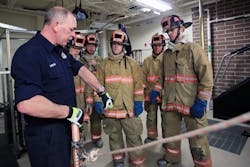Cancer Survivor Story: Doug Wortman
“The earlier the detection, the better off you are.”
—Doug Wortman, Columbus, OH, Division of Fire
Doug Wortman has been a firefighter with the Columbus Division of Fire for 31 years. In the fall of 2005, he was diagnosed with Hodgkin’s lymphoma (Stage 2, Type 2). He has been cancer free since 2006.
How did you learn that you had cancer?
I noticed the lump on my neck while I was shaving. It didn’t hurt, but there was a little lump. I woke up at 4 a.m. to use the restroom, and when I stood up out of bed, I felt very dizzy. I immediately knew there was something wrong with me. I didn’t know what, but I knew there was something wrong. The lymph node was so swollen that it was pushing on my carotid artery, which decreases the oxygen to your brain and, in turn, makes you hypoxic and pass out.
When you were first diagnosed with cancer, did you immediately link it to your work in the fire service?
I had just had a complete physical from the fire department three months before this diagnosis, and it didn’t catch a thing. When I went in, they didn’t even draw blood, because it wouldn’t have shown anything. They had to actually do specific tests to determine that I had lymphoma. One was a CAT scan, and one was a biopsy. For the biopsy, they put me under and took a lymph node out, and it came back positive. All of my symptoms were masked. When I went in to get checked, they asked me, “Are you tired a lot?” and my answer was, “Yes. I work at Station 16, and we’re up all night. When I come home from work, I’m exhausted. I’ve been tired for 15 years." They asked me if I had night sweats, and I answered, “No.” However, that night, I did. It was the weirdest thing.
Another symptom is unexplained weight loss—that’s a big one. I wrote it off, because I had recently quit eating two plates of food at every meal. Lymphoma is usually caused by HIV immune deficiency disorders or environmental exposures. I’ve never had mononucleosis. I’ve never had AIDS. I’ve never been HIV positive. I have been in several nasty environmental situations, so I’m pretty sure we’re going to be able to say that the job is what caused my lymphoma.
How did your brother and sister firefighters support you since your diagnosis?
When I got diagnosed and I went to the fire house, the captain called the alarm office and said, “Put out a PA announcement. Doug Wortman’s going to be off for a while. He’s sick, and we need guys to cover his shift.” The phone didn’t stop ringing for hours. Sixty-three division members of all ranks worked for me. Sixty-three shifts. It really touched me. No one would let me pay them back, so I pay it forward any way I can.
How did your cancer affect your life both on and off the job?
The treatment destroys good and bad. Many side effects that I won’t bore you with but still better than the alternative. I had to get off the street and quit teaching hands on. There is a big mental side to this no one ever talks about. Live your lives. Don’t sweat the small stuff.
Is there anything that you would like firefighters to know about facing cancer?
Listen to your body, don’t second guess it. Don’t put it off. The earlier the detection, the better off you are. I should have asked, “What is that lump on my neck?” and consulted a doctor, but I didn’t. Listen to your body.
Any advice that you have for firefighters concerning the risks on the job?
As far as the risks on the job, it’s come so far since I started. When I started, we didn’t even take showers after fires. I have pictures of me with soot all over me. It was kind of a badge of honor back then. But now with the clean-cab initiative, our hoods, the gear, the particulate barriers in the gear, no dirty gear in the firehouse anymore, clean gear every single time and decontamination processes, they’re doing what they can, but it’s going to take a generation to catch up. We’re still going to lose a lot of firefighters to cancer continually for the next 20 to 30 years, and then I’m hoping we’ll start to see a drop off.
